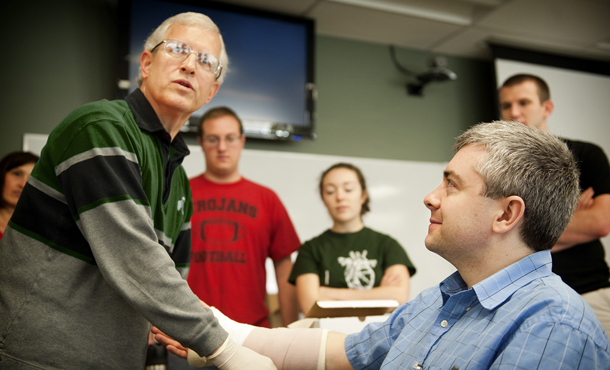Randall Longenecker, M.D., FAAFP, assistant dean for rural and underserved programs at the Ohio University Heritage College of Osteopathic Medicine in Athens, has received a national award for his role in helping prepare medical students and residents for practice in rural areas.
[Randall Longenecker majored in biology at EMU; he is a 1975 graduate who went on to earn his medical degree at the University of Pennsylvania.]
The National Rural Health Association (NRHA) presented its 2014 Outstanding Educator Award to Dr. Longenecker on Thursday, April 24, during NRHA’s 37th Rural Health Conference in Las Vegas. The NRHA is a 21,000-member nonprofit organization that focuses on rural health issues.
In bestowing the honor, the NRHA noted Dr. Longenecker’s work as a longtime rural physician, his efforts in bringing together students from all of Ohio’s medical schools for rural health retreats, and his success in connecting students with opportunities for networking, leadership and advocacy through trips to the nation’s capital.
Dr. Longenecker has spent the past 15 years helping to develop and implement rural training programs, including developing and directing a rural training track (RTT) residency program in West Liberty, Ohio. Through a grant from the federal Office of Rural Health Policy, he has helped create a network of medical education programs, called the RTT Collaborative, aimed at sustaining health professions education in rural areas such as Appalachian Ohio.
Since joining the Heritage College as its first assistant dean for rural and underserved programs in 2012, Dr. Longenecker has helped develop and oversee its Rural and Urban Scholars Pathways program, which prepares primary care physicians for practice in medically underserved settings, both rural and urban. Participants in the program complete rural and urban clinical experiences in underserved areas and receive individualized education planning.
“Although I’ve received other awards for my work as a medical educator, this is the first time the award was initiated by students – and that’s special to me,” said Dr. Longenecker, who was nominated for the award by two Heritage College students.
Earlier this month, Dr. Longenecker helped organize a gathering of about 70 medical educators in Athens whose goal was to develop healthcare strategies for underserved populations and create a sustainable rural physician workforce.
“This was the first time that osteopathic and allopathic rural medical educators from around the nation have met to explore common ground, and at the same time share their unique perspectives in strategically growing a future rural workforce from that foundation,” Dr. Longenecker said.
Funding for the Heritage College’s Office of Rural and Underserved Programs comes in part from the Osteopathic Heritage Foundations’ transformational 2011 gift to the college. The $105 million gift supports Heritage College initiatives that enrich primary care medical education, enhance research that addresses our most pervasive health issues and improve community health.
Courtesy of the Ohio University Heritage College of Osteopathic Medicine, April 24, 2014
